|
Music Reviews
Alternative
Blues
Books
Christmas
Classic Rock
Country
Jazz
Lounge
Oldies
Power Pop
Punk & New Wave
Reggae
Rhythm & Blues
Seventies
Texas
Special Features
Randy's Rodeo
Sex Pistols
Motown
Halloween
Valentine's Day
Information
About Me
Feedback
Links
User's Guide
Support Me
Amazon
iTunes
Sheet Music Plus
|
Support Randy's Rodeo!  Shop at Amazon
for books and more...
Shop at Amazon
for books and more...
 As
a young scuffer on the Isle Of Wight off the coast of England, Philip
Norman played in a skiffle group called the Rave-Ons - named in honor of one of Buddy
Holly's greatest songs, "Rave On," an energetic ode to lust that all but defines
the essence of rock & roll. Ever since, Norman's career has loosely orbited around the
sainted Texas rocker. Throughout the 60's and 70's, Norman distinguished himself as a music
journalist for The Times of London. He established himself worldwide, however, when
he wrote the definitive biography of the Beatles, whose name was a clever tribute to Holly's
band, the Crickets, and who owed a huge artistic debt to Holly's tight rhythms and inventive
songwriting. Later, Norman wrote about Holly himself, and when he published an autobiographical
novel about his halcyon days on "the Island," Norman set the story on the very
night in 1958 that the Lubbock native's plane went down - in the words of Don McLean, "the
day the music died." As
a young scuffer on the Isle Of Wight off the coast of England, Philip
Norman played in a skiffle group called the Rave-Ons - named in honor of one of Buddy
Holly's greatest songs, "Rave On," an energetic ode to lust that all but defines
the essence of rock & roll. Ever since, Norman's career has loosely orbited around the
sainted Texas rocker. Throughout the 60's and 70's, Norman distinguished himself as a music
journalist for The Times of London. He established himself worldwide, however, when
he wrote the definitive biography of the Beatles, whose name was a clever tribute to Holly's
band, the Crickets, and who owed a huge artistic debt to Holly's tight rhythms and inventive
songwriting. Later, Norman wrote about Holly himself, and when he published an autobiographical
novel about his halcyon days on "the Island," Norman set the story on the very
night in 1958 that the Lubbock native's plane went down - in the words of Don McLean, "the
day the music died."
Luckily for Norman and the rest of us, McLean's lyric was literary hyperbole - rock and
roll survived a few fallow years and exploded in a flurry of creativity following the Beatles'
invasion of America. Philip Norman chronicled that explosion at The Times, establishing
himself as a unique voice and collecting the rich headful of experiences that would populate
his writing - both fictional and biographic - for the rest of his career. Along the way,
he met and wrote about several generations of rockers - from pioneers like Bill Haley and
Fats Domino to new wavers like Debbie Harry and the Police.
To the average Joe or Jane rock reader, though, Philip Norman is and will always be the
Beatles' biographer. His Shout! The Beatles In Their Own Generation was a best-seller
and has been in-print all-but-continuously since; as of this writing, it is about to be revised
and republished yet again. This success, inarguably, has as much to do with the Beatles'
enduring popularity as with Norman's sensitive, scholarly treatment of his subject. Still,
the quality of Norman's research and writing should not be underestimated, and much of what
is now considered common knowledge about the Fab Four first appeared on the pages of Shout!
With a name like "Philip Norman," our current subject is easily confused with
other authors and celebrities, and, outside of his celebrated Beatle book, is not terribly
well-known this side of "the pond" - meaning not much has been written about him.
Hence, he may (or may not) have written a number of other books in addition to the ones I
review below. He (almost) certainly wrote the following, uniformly out-of-print works of
fiction - each of which incorporates elements of the author's rock & roll upbringing.
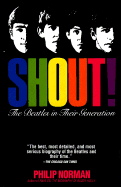 Shout!
The Beatles In Their Generation Shout!
The Beatles In Their Generation
by Philip
Norman (1981)
In my introduction (above), I call Shout! the definitive biography of the Beatles. Well, that's
old news, and I have stated the obvious in an unoriginal fashion - simply adding my voice to a huge chorus
of huzzahs. The typical Beatle freak owns every edition of Norman's universally acclaimed tome, and most
have read each volume more than once. The story of the Beatles' rise and the evidence of their huge impact
on Western culture are well-known to all nearly anyone who has lived in the last half-century. Philip
Norman's Shout! is still worth a careful read for two distinct reasons - he tells the story
better than anyone, and his detailed chronology will provide details to surprise even the best-read
Beatlemaniac. While Norman has a clear affection for the group, his is a clear-eyed, bare-knuckled
telling, and, as
one writer put it, he constructs a "rigorous analysis of the pretensions and affectations of hippie
culture" in the process. [top of page]
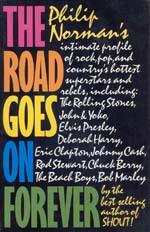 The
Road Goes on Forever The
Road Goes on Forever
by Philip
Norman (1982)
Here's a book that wouldn't exist had it not been for the book reviewed above. The author's Shout! was
the best yet - and some say best ever - Beatle bio, and it sold a boatload of copies (especially given
the then-ill-defined market for rock books). That sudden success led to the publication of The Road
Goes On Forever, an anthology of Norman's earlier music writing for The Times of London.
In a certain way, he resembles a less zany Nik Cohn; they both emerged from Britain's
post-war baby boom brimming with rock 'n' roll energy, and they both write with verve and wit about the
music that captured their imaginations at an early age. Unlike, Cohn, Norman focuses on almost exclusively
on his subjects - not himself - and he rarely threatens to disintegrate into nonsense (which, with Cohn,
is half the fun). Representing nearly twenty years of writing, The Road Goes On Forever is a
functional history of rock and an excellent read - proof that Shout! wasn't built in a day. [top of page]
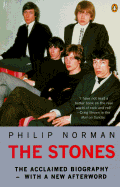 The
Stones The
Stones
by Philip
Norman (1984, revised 1993)
After the success of Shout!, his popular and praised Beatles biography, Philip Norman must have
figured that if lightning struck once, twice would be a cinch. In some ways, he was right. The Stones is
every bit as good of a book as Shout! but - for reasons beyond his control - his follow-up failed
to capture the imagination of the public. Why? Well, by the time Shout! was published, the Beatles
were long defunct and permanently enshrined in rock's pantheon. In 1984, when The Stones hit
the shelves, the Mick and the boys had just released Undercover Of The Night - you figure it
out. Still, the book is a beauty - one of the best in a crowded field - and the Stones still had some
good (if not great) albums ahead of them. Recommended along with similar books by Robert
Palmer, Stephen Davis, and Stanley Booth. (Originally
published as Symphony For the Devil, retitled The Life And Good Times Of The Rolling Stones in
1989 before its current incarnation as, simply, The Stones.) [top of page]
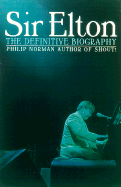 Sir
Elton: The Definitive Biography Sir
Elton: The Definitive Biography
by Philip
Norman (1992, revised 2000)
To many, for Philip Norman to take on Elton John as a topic following his examinations of the Beatles
and the Stones is akin to challenging the Scranton 'Pop Warner' runner-ups after battling the 1974 Pittsburgh
Steelers. As a unregenerate child of the Seventies, I would argue
the contrary. Elton John, like the Beatles, captured the imagination of a generation with his effervescent,
inventive pop, and, like the Stones, had the poor fortune to survive well past his prime and long after
the last vestiges of his musical relevance had fallen away like poorly-applied rhinestones. A handful
of his albums, though (including Honky Chateau and Goodbye Yellow Brick Road) are inarguable
highlights of the post-Beatles, pre-punk period of rock history, and Elton - along with his crack 70's
band - was a riveting, flamboyant performer worthy of Little Richard. But, that was a long time ago.
Elton's diehard fans actually complain that Philip Norman gives short shrift to the last 20 years - during
which the singer descended into mediocrity and received a knighthood. If Sir Elton (well-researched
and written, as always) has a fault, it's that Norman should have skipped the last 20 years altogether,
focusing in the alternative on the cultural and psychological forces that gave rise to the pop juggernaut
known as "Captain Fantastic." Instead, he examines the man as much as the music, and both
come up lacking - infuriating the faithful while frustrating those who see the emperor's recent wardrobe
for
the threadbare farce it is. (Originally published less ostentatiously as Elton John.) [top of page]
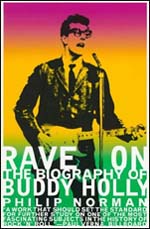 Rave
On: The Biography Of Buddy Holly Rave
On: The Biography Of Buddy Holly
by Philip
Norman (1996)
As I describe in my preface (above), this is a book that Philip Norman was destined
to write. Buddy Holly has followed Norman around like a bespectacled talisman,
drawing a relatively straight line from Norman's
childhood to his later, autobiographical fiction. Despite being the subject of a movie, a play, and
at least one other serious biography, Buddy Holly is frequently omitted from
discussions of seminal rockers.
Little Richard, Jerry Lee Lewis, Chuck Berry, Bo Diddley, Gene Vincent, and, of course, Elvis Presley
are usually mentioned long before the name of Buddy Holly is dropped into conversations about the pioneers
of rock 'n' roll. Too bad, because, in his own way, Buddy was more original than all of them; Mick
Jagger called him "the only truly original white rock 'n' roll musician," and
the English have always had a keener appreciation of Holly's art than his own
countrymen. For his part, Philip Norman lends an
uncharacteristically personal perspective to Buddy, a biography as well-researched and insightful
as any he has written. His undertaking of the book, he has said, was "motivated by three decades
of love, fascination and gratitude" for Holly's music. Far from detracting from Norman's usual
scholarship, though, his passion and honesty help explain why, without Buddy Holly, rock as we know
it might never
had come to exist. (Originally published as Buddy: The Biography.) [top of page]
|
|